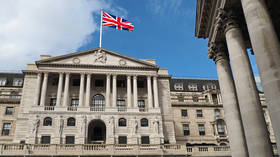UK hikes interest rate to beat 10-year inflation high

The Bank of England (BoE) has raised the key UK interest rates from their historic low of 0.1% to 0.25% for the first time since the outbreak of the coronavirus pandemic, in an effort to combat raging inflation.
The Monetary Policy Committee (MPC) voted eight-to-one to take action following the latest pressure from the International Monetary Fund (IMF), which had previously discouraged the regulator from delaying the move any further.
Rates were slashed to an all-time low in March 2021 in a bid to offset the effects of the rapid spread of Covid-19 cases and pandemic-related lockdowns.
In November, inflation in the UK surged to 5.1%, reaching its highest level in more than a decade with consumer prices soaring, according to Wednesday’s report by the Office for National Statistics.
The latest rate hike came despite mounting concerns that the Omicron strain of the Covid virus could further slow the country’s economy by forcing people to spend less.
Global asset prices initially dropped in response to news of the new coronavirus variant but have since largely recovered, according to the regulator.
“Consumer price inflation in advanced economies has risen by more than expected,” the BoE said.
“The Omicron variant poses downside risks to activity in early 2022, although the balance of its effects on demand and supply, and hence on medium-term global inflationary pressures, is unclear. Global cost pressures have remained strong,” the regulator added.
The rate hike will reportedly add slightly over £15 to an average monthly repayment for a tracker mortgage customer, while standard variable rate mortgage-holders are likely to pay nearly £10 extra per month. Nearly two million UK citizens are reportedly bound by one of these two types of debts.
For more stories on economy & finance visit RT's business section















